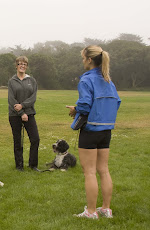 Many parents want to give their child a new puppy for Christmas. Christmas is not necessarily the best time to bring a new pet into the family. Many times there is too much going on with the holiday festivities and/or travel to give you the time necessary to focus on a new pet! Getting a new dog is not a decision to take lightly as it requires research to find the right breed, and remember, it’s a commitment for the life of the dog (usually 10+ years).
Many parents want to give their child a new puppy for Christmas. Christmas is not necessarily the best time to bring a new pet into the family. Many times there is too much going on with the holiday festivities and/or travel to give you the time necessary to focus on a new pet! Getting a new dog is not a decision to take lightly as it requires research to find the right breed, and remember, it’s a commitment for the life of the dog (usually 10+ years).There are too many homeless pets whose owners relinquished them to shelters deciding that they are “just too much trouble” or that they "just don't have enough time for them". In most cases, these people didn't think enough about the responsibilities that come with pets, or didn't do the research necessary to determine the right pet for their family.
Owners need to make a commitment to provide food, shelter, exercise, proper training, and veterinary care. Pets need to be kept safe and owners must have time to dedicate to them. Pets offer lots of love and enjoyment; requiring very little in return.
Research, Research, Research
When considering a purebred, research the breed so that you understand their natural characteristics and know what to expect. Herding dogs are high energy and many times nip at your heels in an attempt to herd whatever they come into contact with (kids, cats, bikes, etc). Hunting dogs require a great deal of exercise and enjoy having a job. Guard dog breeds (like a Dobermans or Rottweilers) are likely to be very protective and need a more educated owner and consistent obedience work. These traits will vary depending on the dog's breeding, but the underlying temperament will be true to the breed.
Match the energy level of a breed with your energy level. High energy dogs will require a lot of exercise and will find ways to release pent up energy if they do not get the level of exercise that they need on a regular basis.
Adopting a Dog from a Shelter/Rescue

Even with shelter dogs where many are mixed breeds, it’s valuable to have an understanding of breed temperaments. The dog's breed origins will give you an idea of its behavior and personality.
Should you choose a purebred dog, consider breed rescue as an option. Most breeds have national rescue organizations dedicated to finding good homes for dogs whose owners can no longer keep them. These organizations often have prospective owners complete detailed questionnaires to insure compatibility between a dog and its new home. Dogs go to rescue for a variety of reasons- some of the most common are divorce, moving, "not having enough time for the dog". There are good, well trained dogs available at shelters and rescues. The Humane Society also has purebred dogs- after you have done your research and determined what breed works for you; visit the website for your local Humane Society for a list of "available dogs" in need of a home.
Also, find a local canine professional to help you choose the right dog for your family. Many professionals offer client services to assist you with your search by visiting local shelters & rescues with you so you can find the most suitable fit. Additionally, they can provide advice to set you up for success with your new pet right from the start.
Other Tips:
Step 1
Consult a canine professional, who can provide useful advice on a breed's behavior and temperament as well as potential health problems.
Step 2
Consider your daily routine. Are you or someone else home often enough to care for a dog? If not, consider adopting a more independent pet, such as a cat.
Step 3
Think about your family. Do you have young kids in the house? If so, be sure to choose a breed that generally gets along well with children.
Step 4
Evaluate your living environment. Is it rural or urban, an apartment or a house? A Chihuahua or Yorkshire terrier may love your one-bedroom apartment, but larger breeds need more room to roam and require more exercise.
Step 5
Supplement the information you receive from a vet or canine professional with further study about different breeds. Talking to dog owners can provide additional advice.
Step 6
Decide whether you want a purebred or a mixed-breed dog. If you plan to show or breed your dog, then choose a purebred. If not, keep in mind that mixed-breed dogs can be just as loyal and lovable.
Step 7
Decide whether you want a puppy or an adult dog. Many wonderful puppies and adult dogs have been abandoned or given up to animal shelters or breed rescue groups, and adopting a pet from one of these sources may mean saving a life.
Step 8
Ask the seller/shelter to tell you about particular habits or personality traits the dog exhibits. If it’s a shelter, ask if you can take the dog for a walk outside so you can get a better idea of its personality and energy level.
Step 9
Ask the seller about the parents of the puppies when visiting a purebred litter. Be sure that each parent belongs to an entirely different family and has been screened for common genetic or inheritable diseases.
Here are some rescue groups located in the SF Bay Area to visit if you are considering pet adoption:
http://www.wonderdogrescue.org/ (puppies available shown in photo above)
http://www.muttville.org/ (senior dog available shown in photo above)
http://www.rocketdogrescue.org/
http://www.milofoundation.org/
http://www.gratefuldogrescue.org/









